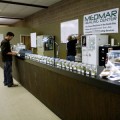Pierluigi Oliverio was the first person in San Jose to see the green tidal wave coming.
Last October, the number of local pot clubs could be counted on one hand. Now, medical marijuana collectives have sprung up in every part of the city—some more legit than others. One web directory currently lists almost 70 San Jose–based medical marijuana dispensaries.
With the San Jose City council finally taking a serious look at regulating medical marijuana this week, the District 6 councilmember could not be blamed for saying, “I told you so.”
“I hate to keep going back, but if we would have done this a little earlier, everything would have been fine,” Oliverio says. “I think avoiding lawsuits where we don’t need them would be a good thing right now. I would not want to see the council pass a regulatory schema that has the same issues that L.A. has now, which is 15 different lawsuits.”
Instead of jumping on the issue as Oliverio suggested in March—looking to other cities’ medi-pot regulations for guidelines and nipping the issue in the bud (so to speak), San Jose has taken months to draw up a medical marijuana ordinance from the ground up.
It’s an ordinance that no one is happy with. The number of local collectives continues to grow, and several are threatening litigation.
Oliverio says the snail’s pace the city attorney has taken on this fast-moving issue is frustrating.
“On March 30, we [the City Council] said, ‘Hey, let’s go do something,’” Oliverio says. “But even then, city staff and the city attorney wanted to reinvent the wheel. We’ve got an ordinance now that’s 60-some pages, and it’s problematic.”
Problematic is an understatement. In fact, the local medical marijuana collectives that originally pushed for an ordinance are livid with the pile of papers City Attorney Rick Doyle is recommending the council adopt. Around 500 people showed up for protests in front of City Hall on Tuesday, and hundreds of local medical marijuana patients attended the June 22 city council meeting.
Dave Hodges, founder of the San Jose Cannabis Buyers Collective, says the city is viewing medicinal cannabis as an illegal drug, not as a prescription medication.
“They’re really treating us like we’re criminals,” Hodges says. “They’re assuming everybody is some kind of horrible drug dealer. But that’s not the facts.”
One passage in the ordinance says the collectives may only use barter and trade, with no cash sales. Another part states that all collectives must cultivate their cannabis on-site.
Putting aside the fact that many collectives maintain a doctor’s-office-like atmosphere, which doesn’t lend itself to large scale plant cultivation, the ordinance also states that collectives may only locate in commercial zones—areas where, Hodges says, setting up large indoor grow rooms would be unrealistic.
James K. Roberts, a San Jose attorney who is representing several collectives, says the ordinance was drawn up with the assumption that there is something wrong with medical marijuana.
“We know that these locations generate very little complaints,” Roberts says. “If they would go and talk to the neighbors, overwhelmingly they are saying things like, ‘Well, gee whiz, we have a little increase in [business] in our sandwich shops.’”
Oliverio says that a big part of this chasm between the city attorney and the collectives results from a failure to communicate on the part of the city.
“At the outreach meeting that was held [at the beginning of June], the city attorney’s office didn’t even attend” Oliverio says. “There were a ton of attorneys, and when they raised legal questions, no one could even offer an opinion. So, I think that the city attorney’s office really needs to be more into the process.”
Still, Oliverio acknowledges that much has changed with this issue since he first brought it to the council last fall.
“I do think the city attorney has a narrow interpretation of the law,” he says, “but you know, that’s sort of what we pay him for. We pay them to manage risk. They see S.B. 420 and the attorney general’s recommendations from Jerry Brown, and Prop. 215. And then they see the federal side [in a booming voice], ‘This is a narcotic!’ So, we are breaking new ground.”
Oliverio hopes an agreement can be reached soon so the city can start looking toward one of the benefits of pot clubs: namely, tax revenues to help San Jose’s foundering budget.
 Great American Seascapes at Cantor
Great American Seascapes at Cantor 


